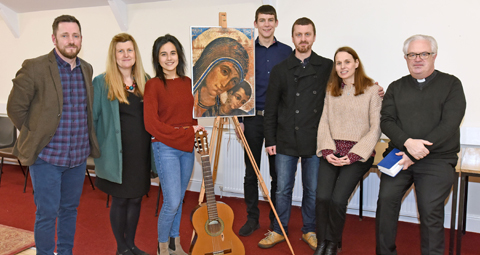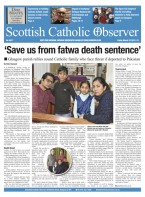BY Daniel Harkins | March 15 | ![]() 0 COMMENTS
0 COMMENTS ![]() print
print

The inspiring stories behind Scotland’s Neocatechumenal Way community
Daniel Harkins meets members of Scotland’s Neocatechumenal Way community, a charism of the Church that supports the formation of Catholics, and discovers how they are taking the movement into parishes and helping people to re-engage with their Faith and the Church.
Joanne went to Mass every Sunday as a teenager. But she only did so to keep her mum happy. She felt she had no real connection to her Faith, and lived her life separated from the Sacraments.
“But the more I looked for life outside the Church, the more miserable I became,” she said.
Joanne McGoldrick is speaking to parishioners of St Ambrose parish in Baillieston, Glasgow, on a Tuesday night. She is part of a group from the Neocatechumenal Way, here in a stuffy church hall to introduce the parish to the new movement of the Church, one of many born out of the Vatican II era.
Over seven weeks in Lent, they are hoping to introduce the Way, as it is known, to the parish, establish a community, and bring people into a closer relationship with Christ.
The Neocatechumenal Way, which was formed in Spain in 1964, is not well understood in the Church. Part of it is the name, which is difficult to say, never mind understand.
Even Catholics deeply immersed in the life of the Church in Scotland struggle to give an answer to what it is and what it does.
There are around 80 members of the Neocatechumenal Way in Scotland, with a community based in St Thomas’ in Riddrie, Glasgow, and one started recently at St Mary’s Cathedral in Edinburgh.
Fighting indifference
Fr Thomas Devlin, parish priest of St Ambrose, has been celebrating Mass for the Way for 10 years, and invited a family from the movement to stay in a vacant house in one of the parish’s two churches.
He said the movement has something to offer to both lapsed Catholics and those ‘going through the motions.’
“It maybe offers something a bit different,” he said. “I think some of us are often just ticking boxes and maybe we all need to get out of our comfort zone a bit.
“For some people who may be a bit disillusioned with regular institutions maybe this has something to offer—people who are switched off and need that wee bit of passion and to see ordinary people being moved and inspired.”
Joanne is the first member of the group to speak to the parishioners.
“I was brought up Catholic and always went to Mass,” she said. “But I believed my life belonged outside of the Church. My life was totally separate from it.”
Then she found the Way, joining the community at St Thomas’.
“Slowly,” she said, “I found the life I had been searching for. The Way helped me heal relationships. I’ve been healed through this journey.
Joanne is now expecting her ninth child—large families are a hallmark of those in the Way—something she says which would have been unthinkable in her old life.
“I would have thought [having nine children] would be a living hell,” she jokes. “But through the Way I have found peace in the home.”
Finding the Way
Tony McBride, 43, is a teacher. He has seven children—he jokes that he’s ‘letting the side down.’
Like Joanne, he came to the Way from a lapsed Faith—still attending Mass, but going through the motions.
He grew up in Cranhill, Glasgow, and his family later moved to Riddrie.
“As a teenager I entered into a rebellion as a result of a troubled home life,” he said.
Tony said he questioned how God could exist when his life was such a mess.
“I went to church on Sunday, but my real life was going out with friends and drinking,” he said.
It was his mum who asked him to go along to the Way, and he says he was attracted by the number of young people involved and the music, which is another part of the movement.
“There was just something different about it, and I heard some practical things about how Jesus could help me. Through all my sins and struggles the Way had given me a community.”
Small beginnings
The Way was formed in the 1960s by Kiko Argüello and Carmen Hernández, and was born out of shantytowns in Madrid, where the two ministered to the poor.
Little by little it grew, spreading through parishes in Spain and eventually the world. It now has more than one million adherents in parishes worldwide.
According to Vatican News, the Way ‘is dedicated to post-and pre-baptismal formation of Christians, based on the word of God, the Eucharist and the Christian community’ and engages families who ‘through their witness and life serve to establish the presence of the Church in countries where the Church is absent or tiny, or to revive and strengthen the presence of Catholic communities in difficult and highly secularised areas.’
This would certainly apply in Scotland.
Teresa Lally is no longer involved in the community—she is active now within Catholic Charismatic Renewal—but it was through the Way that she rediscovered her Catholic roots.
She described the Way as an ‘adventure learning about our Faith.’
“For me, it made me appreciate and love the Roman Catholic Church, the beauty of the Mass and the Sacraments, and gave me a grounding in Catholic dogma and the magisterium. It also made me know my Scripture and love and appreciate it.”
She explained the Way is also evangelistic, and that members hold street events and pilgrimages, and even go door-to-door to spread the Gospel.
“Although I am no longer in community, I have a big love of it and appreciation of how it has formed me as an active Catholic,” she said.
“In my experience people in the Neocatechumenal Way, despite some bad press, get very involved in parish life, supporting and serving the parish.”
Bad press
The Catholic newspaper Crux described some of that bad press in a recent article. “In some parishes, congregants have complained about the small groups, meeting apart from the larger Church community,” it read, attributing the criticism to a general ‘wariness of something new.’
In 2017, the Bishop of Lancaster issued new rules for the Way’s liturgies, saying that while the Way had been a ‘blessing,’ there was a ‘growing sense of unease’ about ‘some of the differences in the way the Mass is celebrated among the communities’ of the Way.
However, Fr Devlin said such criticism is certainly not apt in his experience at St Bridget’s.
“The members of the Way I know come to Sunday Mass every Sunday and are very much a part of the parish,” he said.
“They do meet up as a community but they are not separate from the Church.
“If people get to know them they will see that they are just ordinary people. I have always found them very inspirational.”
At the catechesis talk, the Way members were keen to stress that the Way is not separate from the Church, and that their Masses have the same solemn dignity as Sunday Mass.
Papal support
Both Pope Francis and Pope Emeritus Benedict XVI have praised the Way as a crucial part of the New Evangelisation, and its advocates point in particular to its ability to reach young Catholics.
Last year, the Church in Scotland, at a national and diocesan level, and its youth structures and officers, made the decision not to organise pilgrimages to February’s World Youth Day (WYD) in Panama, due to the cost and timing of the event.
Even those who had made every WYD for more than a decade gave this one a miss. But three young members of Scotland’s Neocatechumenal Way community refused to take No for an answer and made the journey to see Pope Francis.
Madalena Fonseca, 21, Louise Swan, 21, and David Sanchez, 19, have all been in the Way since childhood.
Louise’s father was introduced to the Way in Spain by the woman who would later become his wife, and settled into the community in Glasgow.
Louise said that the singing and music that takes place is part of the attraction of the Way for her.
She explained that a typical week in the community involves adopting a theme—such as ‘life’ or ‘the Cross’—and taking a word related to that theme from the Bible for discussion.
“You can then discuss that word and how you feel it relates to your life, and how you saw God in your life that week,” she said.
Madalena said that this active part played in the service is what attracts her to the Way.
“You are not just there sitting down and leaving,” she said. “You are invited to participate, and to share and speak about what you’ve lived through the week. You are not just there to fill a chair.”
Madalena came to Scotland from Portugal 10 years ago. Her parents had heard a call to evangelise, she said. For her, the Way is where she can ‘find a way to get answers to my life.’
“You have to live it to understand it,” she said. “For me it’s hard to explain but it’s a big part of my life. It’s where I hear the Word of God and find my Faith.”
— The Neocatechumenal Way Lent talks are on-going in St Bridget’s Church hall in Baillieston’s St Ambrose parish. They take place on Tuesdays and Thursdays from 7.30pm. All are welcome.










